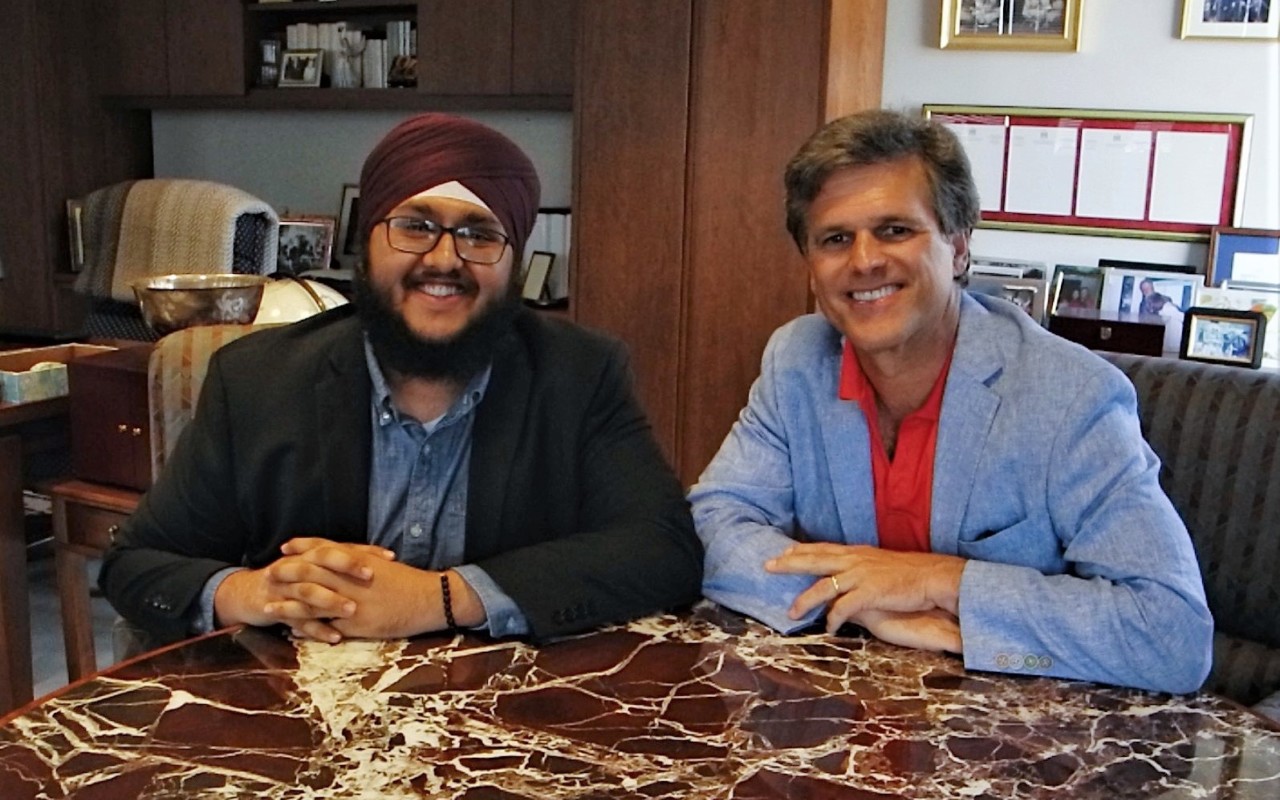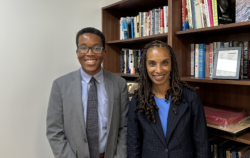
Ubben Posse Fellow Interviews: Tim Shriver
The Jeff Ubben Posse Fellows Program awards five exceptional Posse Scholars $10,000 each and the chance to spend 4-6 weeks during the summer shadowing and learning from a major industry leader. The interview below with Tim Shriver, chairman of the board of the Special Olympics, was conducted by Posse Scholar Gurbir Singh, now in his junior year at the University of California, Berkeley, who worked with Tim Shriver as a 2019 Jeff Ubben Posse Fellow. The conversation has been edited and condensed.
GURBIR: Tell me about your childhood—growing up, your parents, that kind of thing.
TIM SHRIVER: I am the middle child of five children. I think the most defining feature of one’s childhood outside of one’s parents is where you fit with your siblings. Siblings tend to shape us all in ways well beyond what we normally realize. I grew up for the most part here in the Washington, D.C., area. Right after I was born my parents’ lives were overtaken by being involved in a Presidential campaign, which ultimately resulted in the election of [my uncle], President Kennedy.
I grew up in a family that was different in many respects on the political side of things. My mother was well before her time, really a full-time if not double-time professional, and my dad was traveling around the world looking at issues around peace and the relationships between the U.S. and emerging economies and cultures. He was going to countries that many Americans had never heard of, much less been to. A global consciousness was just emerging and he was at the forefront of that. In my mom’s work the changing societal ideas about disability, the thinking that people with disabilities should have equal access to dignity, education, healthcare, community living, education, were very, very early. Both my parents were quite on the cutting edge of their respective fields, trying to use the leverage between political and policy issues and grassroots communities.
“Both my parents believed very deeply that lasting change happened from the bottom up.”
I was schooled as a child in the idea of, how do you mobilize changes in people? And how do you use the volunteer spirit, the desire to make a difference, to channel it into policy or political change? Both my parents believed very deeply that lasting change happened from the bottom up, not the top down.
Think back to the first time that you had a leadership role, and talk me through that.
When I was a little boy, I remember being asked to take care of raising the American flag at Camp Shriver. Is that leadership? I suppose it is. It’s a role that is clear, that is valued, and in my eyes seemed almost sacred.
I think any time you have a clear role in the world, it feels empowering. No matter how small it is. That might not sound like leadership, it’s not going to be in the Harvard Business School idea of leadership, but it’s a clear role and it’s a valued role. You’re being told that there is something indispensable that you’re doing that is needed by the whole.
Do you think untapped potential would be realized if more leaders could think of leadership in this way?
I have my little leadership formula, it goes, “Goals, Roles, and Souls.” When groups work well together, they know what the goal is. Individuals or small groups know what their roles are to help achieve that goal. The missing thing in leadership is often the soul dimension—which is at a deep level, I see my place in the universe as being manifested through this role to achieve this goal.
Now that doesn’t mean you have to be achieving some higher social goal. You can be trying to improve the sales of your company, but if the goal of improving sales and your role in it reminds you of the deepest sense of who you are, then you’re not just selling. You’re bringing the deepest part of you along, the part that hungers for a participation in the whole—that’s what I call the soul. My experience is when you put those three things together, then that counts for a good deal of what separates effective leadership from less effective leadership.
How do you think that you can promote that understanding of leadership?
I don’t think it is promoted, honestly, I think what is typically promoted is having the best idea, being able to sell it and being able to get people to follow you. I don’t mean that’s wrong, but it’s not particularly emotionally intelligent. It’s not often particularly sensitive to the complexity of modern life.
When I look at Special Olympics athletes, they might not be what some would see as business school types, but they are very powerful leaders. So, how do they lead? Their powerful leadership comes from this soul dimension, this capacity to create vulnerability and openness, and a trust connection. When you feel that, you can knock down a brick wall, because you are all of a sudden being invited to tap into your deepest sense of belonging and meaning and participation and desire. And that awakens you.
How do you operationalize leadership in a way that considers the soul dimension?
“ I have had to learn how to leverage this inverted pyramid.”
Look, Special Olympics has over one million volunteers, and we have no traditional type of power over most of our workforce. This is a system where all the energy and accountability comes from the grassroots, unlike most systems, where all the accountability and energy comes from the top down. You’re a manager, and you’re looking up to a senior manager, so on so forth—so everyone is looking for a central source of authority. In our system, everybody looks to our athletes and families for power. I’m sitting here theoretically at the nexus of a system that doesn’t care who is at the top. I have had to learn how to leverage this inverted pyramid to let the viscerally powerful and meaningful experiences inherent to Special Olympics drive the programming decisions we make. I have had to learn to lead and manage in a way where our athletes have the loudest voices in the room. We have Special Olympics athletes on our board who hold us accountable. When they speak, there is literally a hush in the room.
Do you think identifying truths and engaging the soul level of an organization or a movement is a transferable technique to any industry?
I think it is. I think everybody brings their soul to work, whether we like it or not. I think it takes a bigger picture view. It means that you’re looking for a different chemistry, a different DNA on your team, a different balancing of life and purpose mission, a different way of explaining your value proposition. I believe that right now there are very few companies that will survive this era of transformation unless they are able to articulate their missions and their purpose at a much deeper and much more profound level. If they’re not able to tell their employees and their customers that what they’re doing is good for them, what they’re doing is important for the future, what they’re doing is safe for the planet, what they’re doing is responsible for their communities, if they can’t pass those threshold tests, I think they’re in for big trouble.
Those questions have now emerged because of the public discourse, it’s inviting people to say, wait a second, these questions all have one thing in common—people want lives of meaning and purpose. It’s a change that’s forcing out old models but it’s inviting in big new opportunities, and I think the future, how that happens, will be determined by your generation.
If you were advising a college student or graduate on what things they should focus on, what would you say?
I think the most important thing in your career is who you work with or who you work for. I don’t think your title, especially when you’re young, and when I say young, I mean under 40, I don’t think your title matters. Compensation obviously matters, but less than you think. What really matters is the who. People say to me, “I had an interview at this company and I’m not sure if I want to work there.” And I say, “Who would you be working for?” and if they say “I’m not sure,” I say, “Then don’t go there!”
In any industry anywhere in the world, there are people who are horrible to work for and will crush your career. In the same places, there are people who will see in you something you’ve never seen in yourself, who will allow you to thrive and grow. And they don’t have to be at Fortune 500 companies, they could be at the local burger joint. I think the most important thing in life is the who. And I think if you work with or for a smart, gifted person who inspires you, your career will take off. Because that person, that connection, will drive opportunity, drive learning, will drive hope.
Read More:
Ubben Posse Fellow Interviews: Oskar Eustis
Ubben Posse Fellow Interviews: David Ricks
Ubben Posse Fellow Interviews: Jenny Rickard
Meet the 2019 Jeff Ubben Posse Fellows.

